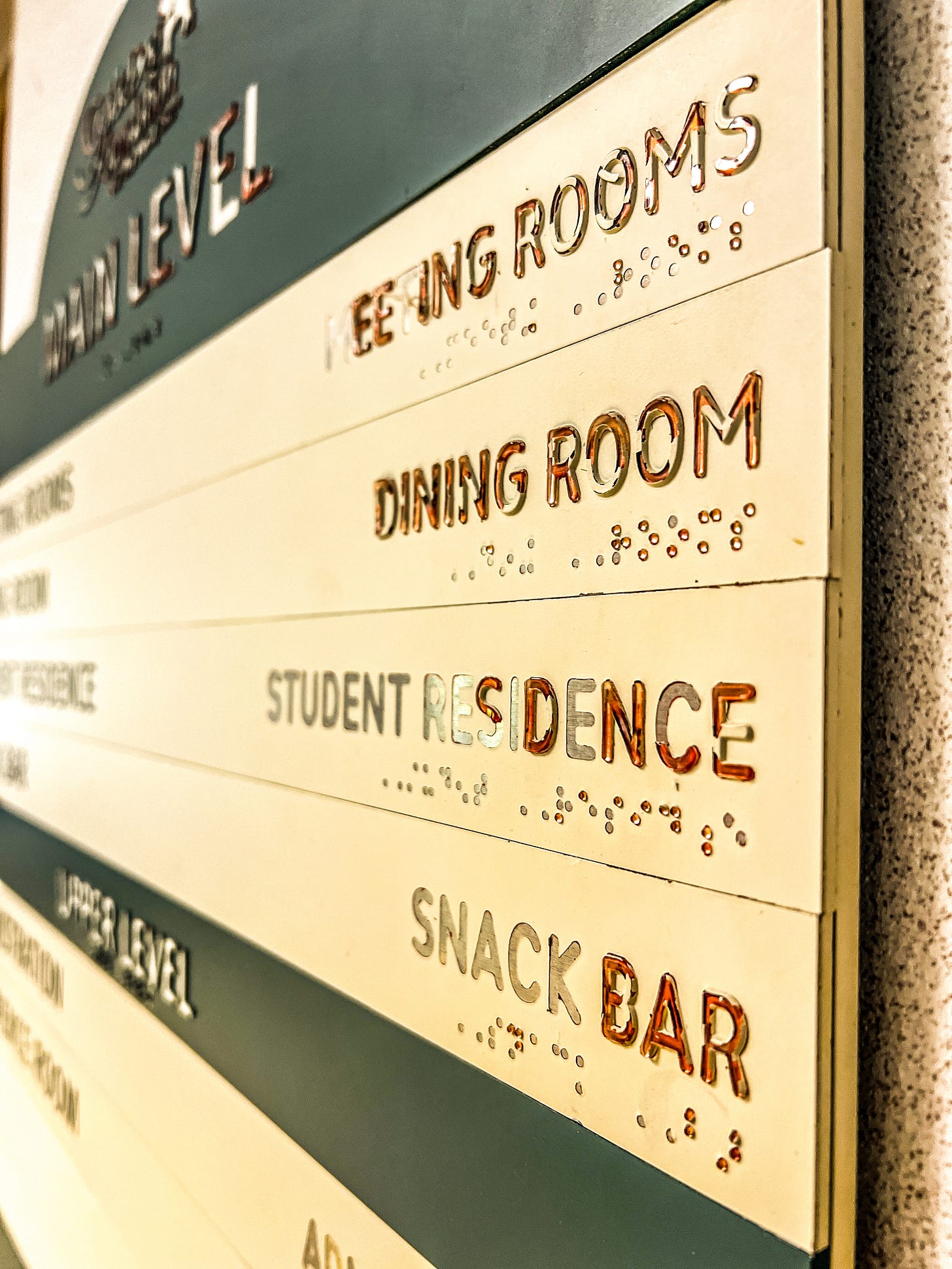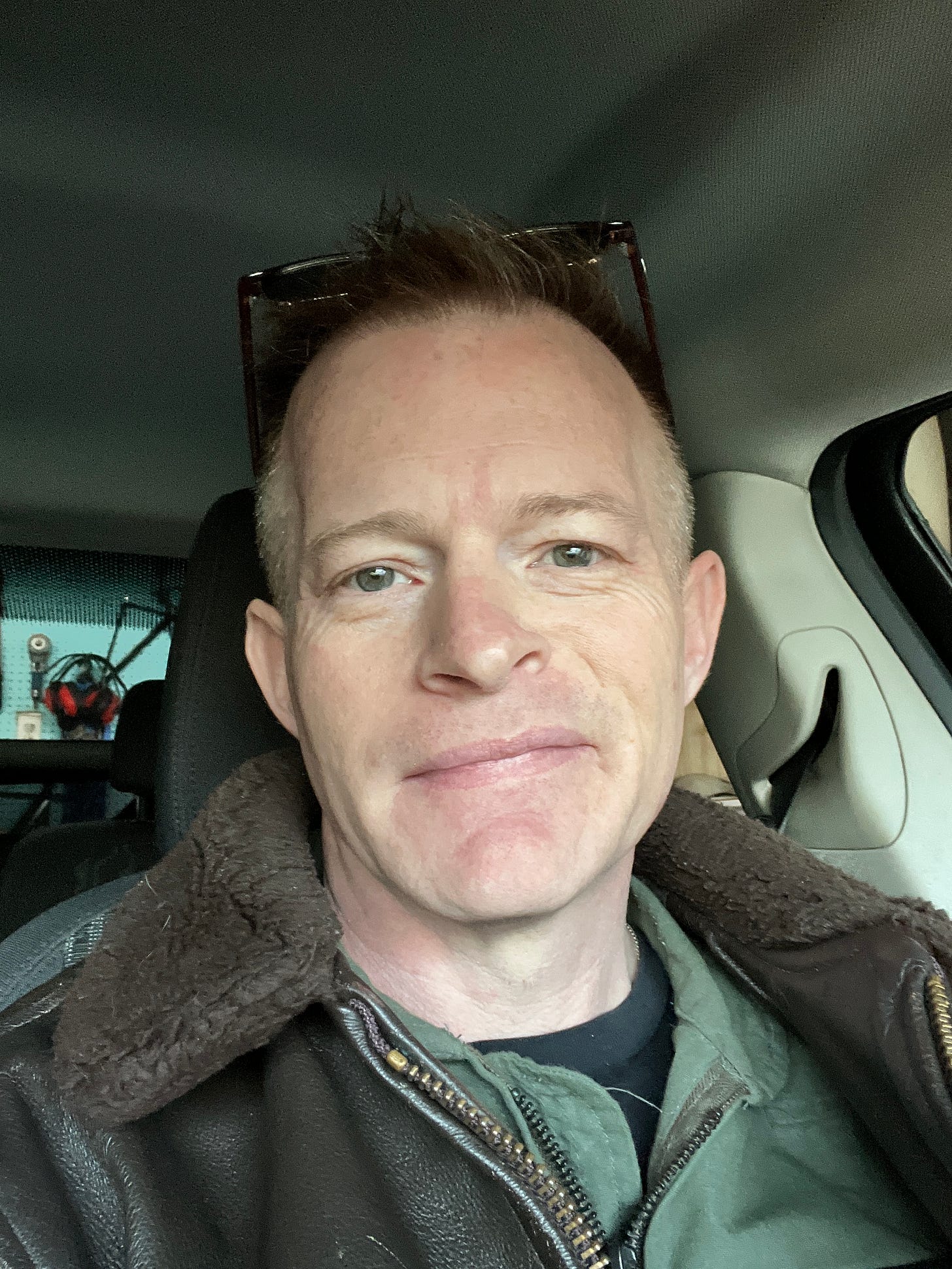About This Series
The Spirit of Recovery is a deeply personal account of my journey to receive and train with a PTSD service dog after a long wait and a longer struggle. Told in episodes, this series explores the awkward beginnings, emotional reckonings, and unexpected grace found in the process of learning to receive help. It’s about healing—not as a breakthrough, but as a quiet, daily decision to keep showing up.
Know someone who might appreciate this series? Please share it with them!
Day One
I flew a short hop from DC to New York City—just thirty minutes in the air—but landed in what felt like another world entirely. The city was cloaked in a thick morning fog, the kind that conceals everything below a soft ceiling of white. Only the tallest buildings broke through the mist, floating like islands above an unseen ocean. It was strangely beautiful, and strangely fitting.
Waiting for me at the gate was an elderly couple who volunteer for the dog foundation. They were warm, talkative, familiar in that small-town way that makes you feel, if not entirely at ease, then at least less adrift. Together we drove east, out toward the heart of Long Island.
Long Island is its own kind of universe—one long stretch of seamlessly connected towns, like beads on a string. There are no wide-open spaces between them, no transition zones. One quaint village gives way to the next, and the next, each one marked by manicured lawns, elegant storefronts, and the occasional American flag waving proudly from a porch post. It is nothing like the big city.
The people here take pride in their quiet communities and have little patience for the chaos of Manhattan. They have a word for city folk—cidiots—and it’s said with the perfect mix of disdain and humor. I laughed when I heard it. It was clever. And not entirely unfair.
We pulled into the facility around 9am. The campus unfolded like a miniature town of its own—several buildings, walking paths, simulation zones, and neatly landscaped green spaces. Everywhere I looked there were pairs of dogs and trainers, walking with purpose. Some of them stopped at the edge of a sidewalk, others paused to assess obstacles, all of them rewarded with praise or treats. It was a constant ballet of practiced movements—stopping, looking, listening—interwoven with the daily rhythms of sightless navigation. I could already feel the precision of this place, the seriousness with which they approached their mission.
Inside the main building, the energy was focused but not frenetic. Staff and trainers came and went. The air smelled faintly of dog shampoo and fresh coffee. Walls were lined with framed photos of past graduates—dogs and their blind handlers, captured mid-step or mid-smile. The signs posted throughout the building were raised-letter and braille. Many were well-worn, their lettering rubbed smooth by hundreds of seeing fingers searching for orientation. You could feel the history here, not just see it.
I was the first student to arrive, which meant there wasn’t much to do but wait—and think. So I wandered the grounds for a while, trying to get my bearings. I talked to the staff. I walked in one of the facility’s outdoor parks… and cried. Quietly. Often. I felt afraid, vulnerable, completely out of place. I didn’t want to be here. I did want to be here. I was conflicted in that way you can only be when you’ve asked for help—and it’s actually been given.
It was clear I needed time to decompress—to shed the armor I’d worn just to make it this far. I hoped, by tomorrow, I’d be in a better headspace. More settled. More ready to do what I came here to do. And let’s be honest—that doesn’t include wallowing in fear or circling endlessly around self-pity. I came to learn. I came to be helped. I came to heal.
I thought about where I’d been over the past two years since someone first suggested I get a service dog. I’ve done a lot of work. I’ve sat in countless therapy sessions. I’ve faced things I used to bury. I’ve healed—or at least, I’ve tried to. But is it enough? Am I healed?
I’d read something recently that stuck with me. It said that most healing doesn’t happen in grand, cinematic moments—not at retreats or in therapist chairs during emotional breakthroughs. Most of it happens slowly, in small, quiet ways. Healing, it said, accumulates through repetition—tiny shifts, day after day, barely visible as they’re happening. Which means most of the time, we don’t actually know if we’re getting better. There are no obvious signs. No mile markers. And our emotional state is too fluid, too deceptive, to serve as a reliable gauge.
I copied the words into my journal as a reminder:
“To me, the middle feels like a waiting room where you’re forced to do the work without any confirmation that it’s leading to something real.
There are no clear signs of progress. There are no trophies, no applause, no markers telling you you’re on the right track. Only the quiet, persistent effort, repeated day after day, with no clear sign that it will ever amount to anything.
This is where the doubts creep in. You question whether you’re good enough, whether you’re doing things right, or if you’re just not cut out for it. You wish you could skip ahead to the end, where things make sense, where the results show up.” - Patricia W.
That perfectly captured how I felt in that moment—wandering alone beneath the spreading oaks and maples, their leaves slipping free and spiraling to the ground. I walked for hours, hoping the motion would settle something inside me. Hoping to stumble upon a sign, a feeling, some kind of confirmation that I was on the right path. I wanted something solid to hold on to. Something certain.
Instead, I found only the echo of well-meaning voices—friends and loved ones who smiled and said everything would be okay.
But at this point, I was anything but okay.
What was I thinking?
Dogs take a ton of work. I travel constantly for work—flights, hotels, logistics. How am I supposed to manage this extra responsibility? It’ll be like having a toddler all over again. How is that supposed to help me?
The cold, hard truth is that when I was first recommended to get a service dog, I didn’t think it through. I was too disoriented, too unmoored. I remember feeling like I was being led through life by the shoulders, just trying to stay upright. Maybe, back then, I thought a dog would be fun. Maybe I thought it would make me feel special. Maybe I just wanted to be noticed.
And now, two years later, here I was—on the verge of receiving the culmination of countless hours of training, care, and commitment from people I didn’t even know. People who had given their time, their effort, their hearts. All for me. I searched for the right word to describe what I was feeling, and the only one that surfaced was fraud.
But that word stopped me in my tracks.
On the plane ride in, I had read something that spoke directly to what I was feeling:
“Here’s the truth that many don’t understand: when we grow up without consistent, unconditional love, it changes us. It shapes the way we see ourselves, how we relate to others, how we trust (or don’t trust) the world around us.
As a child, you may not realize it, but you start to learn that who you are isn’t enough — that you need to be more, do more, or somehow be different to be worthy of love and acceptance. If your own parents, the people who were supposed to love you without conditions, couldn’t offer you that, then how could anyone else? How could you possibly believe you’re worthy just as you are?
Even when someone does care about you, you doubt it. There’s a voice in the back of your mind that says they couldn’t possibly mean it — that they just haven’t seen your flaws yet, that you’re somehow unworthy at the core.” - Consciously
The weight of it all hit me like an elevator in freefall.
Was it possible the reason I was struggling so much was that I simply didn’t know how to receive love?
This dog—this living, breathing companion—was being offered to me, freely, from a place of love. The people behind this gift didn’t know me. They weren’t asking anything in return. They just believed someone like me was worth helping. I couldn’t comprehend it. I couldn’t force myself to believe I deserved that kind of grace.
That’s what I’d been wrestling with all day—trying to tally up my deeds, to prove to myself that I had earned this. That I was good enough.
And that’s exactly why I was so uncomfortable.
Because love doesn’t work like that.
There is no accounting for love. It isn’t earned. It is freely given.
All I have to do is receive it.
By early afternoon, the other students began to trickle in. Once the group was mostly assembled, we had our first lecture—on dog collars, of all things. It sounds simple, but they’re incredibly particular about how each collar is worn, positioned, and handled. We all had to practice fitting them onto a full-sized stuffed dog, adjusting our hand placement and correcting each other gently. It felt a little ridiculous, but also… grounding. Like we were rehearsing something important, which we were.
With the lecture complete, we moved on to dinner: teriyaki chicken over rice with steamed broccoli—simple, delicious, comforting. The facility has its own executive chef who prepares all the meals. We were warned at the beginning that the food was delicious. We all ate together, just a handful of strangers slowly becoming something else.
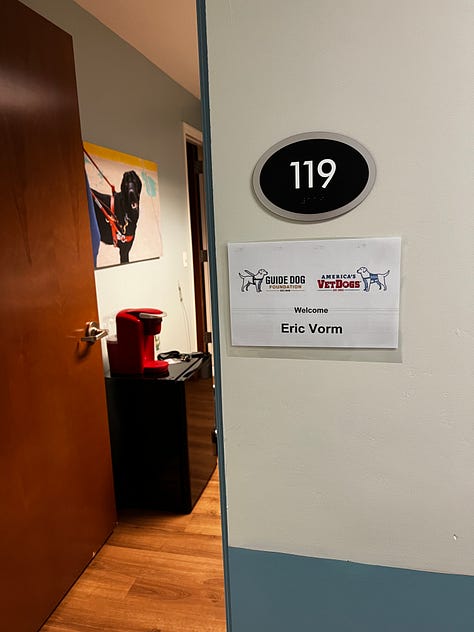
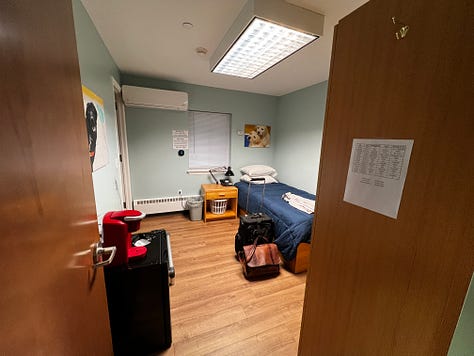
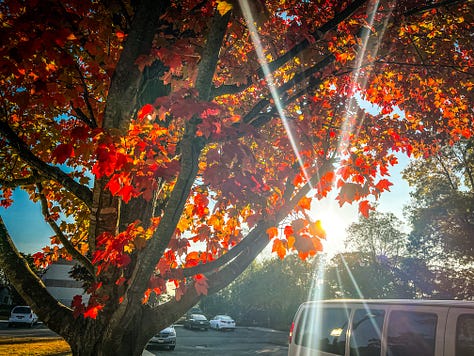
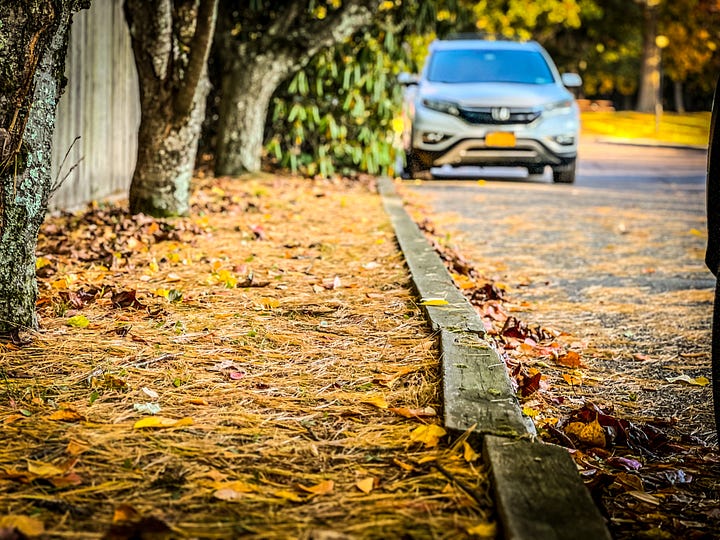
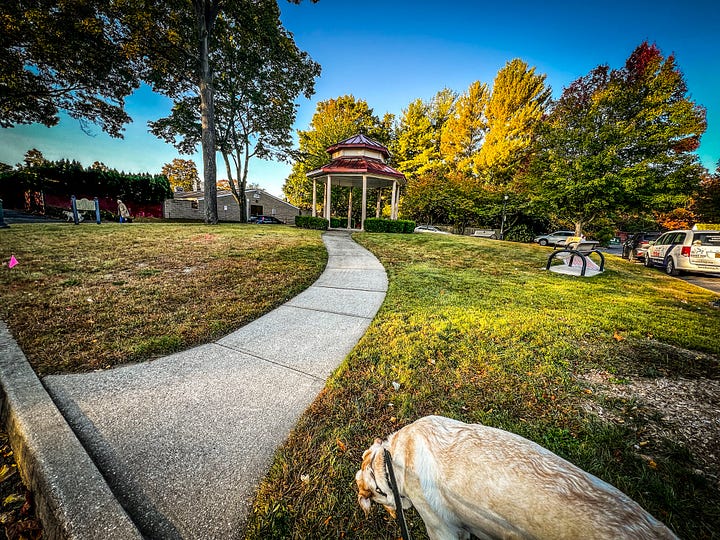
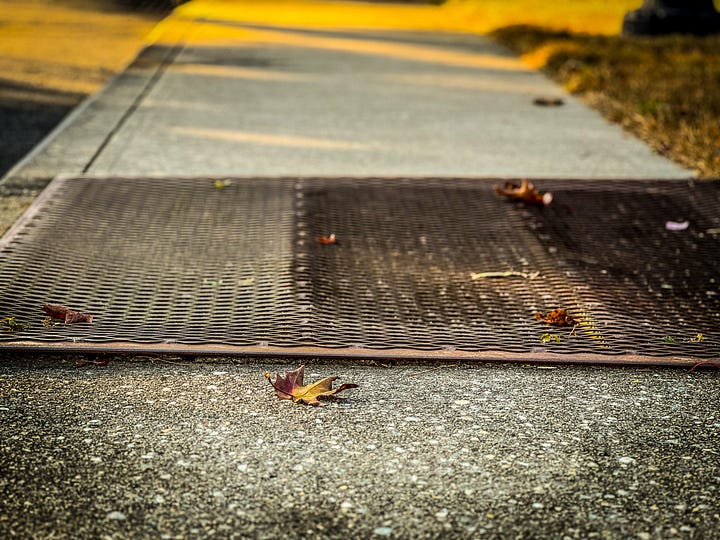
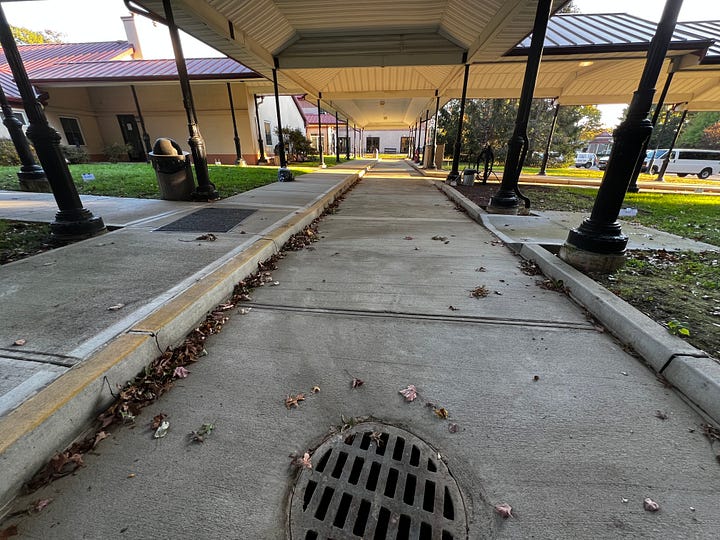
The students, as expected, are a colorful bunch. One guy is a two-time cancer survivor—pancreatic and liver. Another is from New Orleans, his accent so thick it practically needs subtitles. A few are younger vets, mid-thirties maybe, trying to rebuild their lives through college and new beginnings. One man has only 20% of his hearing left; his wife accompanies him and helps interpret when needed. Everyone was kind. We joked around right away.
Somehow, within minutes, they figured out I was an officer. I didn’t say it. I still don’t know how they knew. But it quickly became a running gag—“Oh no, the officer’s here, time to straighten up.” They pretend I’m going to conduct inspections whenever someone stands in front of the group. It’s all good-natured. That familiar camaraderie that military people slip into like an old hoodie. I didn’t expect it, but I welcomed it.
After dinner, we had another hands-on session—this one focused on leash handling and “marking” behaviors. Marking, in this context, means saying “yes!” at precisely the right moment and immediately offering a reward, reinforcing the desired behavior. Timing, body mechanics, tone of voice—it all matters. We practiced the moves repeatedly, swapping leash hands, shifting stances, learning the rhythm like a dance. Everyone participated, and though skill levels varied, the atmosphere was kind. No one rolled their eyes. No one scoffed. It was the kind of place where people help each other find their footing.
During the final lecture of the night, the instructors talked about the coming days—the transition the dogs will experience as they shift from kennel life to full-time assistance. For the past six months, these dogs have lived in highly structured environments. Now, they’ll be asked to bond with someone entirely new. Us. There may be growing pains. Strange behaviors. Emotional hiccups. Dogs, it turns out, struggle with change too.
I sat with that thought for a while. Okay, I told myself. We’ll get through this together—you and me. That’s what this is about, isn’t it? Healing, through companionship. Recovery, through service. Not just the dog’s service to me—but mine to the dog as well.
After the lecture, I was picked up by a local man named Billy—someone I’d met through this program earlier in the year. We drove a few towns over to a 12-step meeting. On the way, we swapped stories. No pretenses. No performances. Just two people, sharing the road and something deeper beneath it. The meeting itself was solid. Familiar. A small sanctuary tucked into unfamiliar terrain.
Back in my room, winding down, I took time to reflect. I had many ups and downs on this first day. The prospect of getting the dog scared me. The prospect of taking the dog home and having it with me all the time scared me even more.
I can’t earn this, I told myself.
My job right now is to receive.
I am enough.
Tomorrow’s schedule begins early: 0645 is the first activity. I still don’t know what I’m doing here. Not really. I’m uncomfortable. I want to leave. And I want to stay.
But I asked for help. And help was given.
Now it’s time to receive it.
Now is when the real work begins.
About the Author
ES Vorm, PhD, is a combat veteran and aviator turned scientist who found out the hard way that achievement doesn’t equal healing. After years spent in special operations, military aviation, and human-machine teaming research, he now writes about the quiet, uncertain work of recovery—what it means to receive love, reimagine identity, and find grace in unlikely places. He lives with his family, his service dog, and a growing capacity for stillness.






